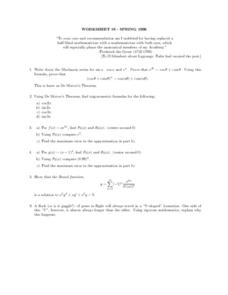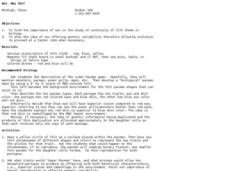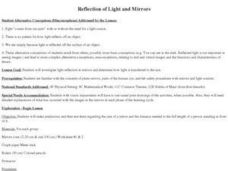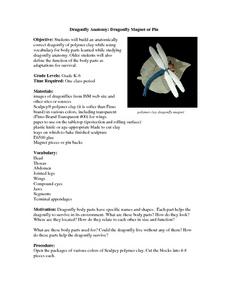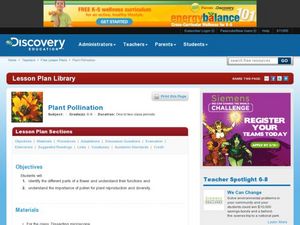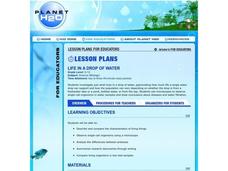Curated OER
Making Cents of the Senses
Students explore sight and hearing. In this senses instructional activity, students read Brown Bear Brown Bear, discuss how eyes are used for sight, and chart the eye color of the students in the class. Students discuss how hearing is...
Curated OER
See the light
How do light and eyesight function? Read a brief passage explaining the phenomena of light and sight. Then have learners draw arrows showing how a boy in a room with a lamp would be able to see a chair. A mini-experiment suggestion is...
Curated OER
Using Imagery To Introduce the Endocrine System
Students listen with closed eyes to a story that starts in a relaxed tone and ends in a scream. They list the body reactions they experience: fast heart rate, shaking, etc. and hypothesize the reason for the reactions. They explore the...
Curated OER
The Human Body
Students make life-size models of their bodies by having a partner trace them. They glue the basic body parts in the proper places and decorate them with hair, and facial features.
Curated OER
Our Eye in the Sky: The TIROS Weather Satellite
Students investigate the political context of the creation of a weather satellite. For this technology and society lesson, students explore the historical, technological, and political context of the TIROS weather satellite. They write a...
Curated OER
Eyes From the Past
Learners view examples of classical Victorian artwork. Using a painting, they discuss their own opinions about what they believe the artwork is trying to tell them. In groups, they compare and contrast the artwork of Robert Harris and...
University of Kansas
Exponential and Logarithm Problems
This worksheet manages to provide both fun and serious work solving exponential and logarithmic application problems in engaging story lines and real-life situations. A strong emphasis on science applications and numbers pulled straight...
Curated OER
Perceptions of German Unification Over Time
Through a series of readings and handouts, learners will study the shifts in perception that followed the fall of the Berlin Wall. The history lesson plan focuses on periods of change in post WWII German history that led to a changed...
Curated OER
Worksheet 19-Spring 1996
In this math worksheet, pupils begin with the Maclaurin series and prove De Moivre's Theorem. They use the De Moivre Theorem to solve four problems. Students apply these theorems to explain why a flock of geese will fly in an uneven...
Curated OER
The Brief American Pageant: The Furnace of the Civil War
The eyes of an American History teacher (or Civil War buff) will open wide with this series of maps, which detail the campaigns and battles of the Civil War. Meant to supplement chapter 21 of The American Pageant, this presentation would...
Curated OER
But, Why Sex?
Students investigate the importance of sexual reproduction in evolution. In this sexual reproduction lesson plan, students simulate species with two traits: eye and skin color. They determine what characteristics are beneficial for the...
Curated OER
Reflection of Light and Mirrors
Students address common misconceptions concerning reflection, light and mirrors. They investigate light reflection in mirrors and determine how light is transferred to the eye. In addition, they make predictions and then test them...
Curated OER
THE MANY COLORS OF SUNLIGHT
Students examine rainbow components, spectral colors, colors perceived by the eye, hot solids, glowing rarefied gas, absorption, that light is a wave, and optics.
Curated OER
Travel Brochure for a Cell
Students create a brochure to entice readers to 'visit' their cell organelles and functions 'amusement park'. Students use humor and 'roadside attractions' for an inspiration - 'visit the ribosomes to watch proteins synthesized before...
Curated OER
Dragonfly Anatomy: Dragonfly Magnet or Pin
Students build anatomically correct dragonflies of polymer clay, use vocabulary for body parts, and define the function of the body parts as adaptations for survival.
Curated OER
Plant Pollution
Learners study the different parts of a flower and their functions. In this pollination lesson plan students study a flower under a microscope.
Curated OER
CD Snowman
Students design and produce snowmen. In this winter instructional activity, students use CD's to create 3 dimensional snowmen. Students discuss the senses of sight and touch as well as compare their craft snowmen to a real snowman.
Curated OER
Sea Horse Body Parts
Students complete a diagram of sea horse body parts. In this sea horse lesson, students review the story Sea Horses A True Book, complete a sea horse diagram using Internet sights to help, make new entries in their KWL charts and work...
Curated OER
The Cell
Students visualize plant and animal cells, explain the parts of a cell and their functions and distinguish plant cells from animal cells. Working Students, in groups, must present a particular portion of a cell to the entire class.
Curated OER
Teaching and Learning Through Objects
Students identify and interpret the function, usefulness or utitlity, form, beauty or aesthetics, and meaning, context or story, of objects and how they learn new skills and make things that they learn traditionally, by observation and...
Curated OER
Life in a Drop of Water
Students examine the structure, function, and characteristics of microscopic organisms that inhabit freshwater through collection of water samples and observation through microscopes.
Curated OER
Phytoplankton and Ocean Color
Fifth graders identify function of phytoplankton in the biospere by conducting experiments and simulations and reading for information. They detect the presence of phytoplankton in bodies of water by examining ocean in satellite images...
Curated OER
Writing
Students write poems and a narrative story. In this writing lesson, students read stories and poems written by other students and read examples of haiku's and diamonte's. Students write an acrostic poem and a diamonte poem. Students...
Curated OER
Once Upon A Math Story
Learners write a math story. In this math operations and writing lesson plan, students work in small groups to brainstorm ideas for a math story, write a rough draft, revise their story, edit their story and add clip art. Learners read...










